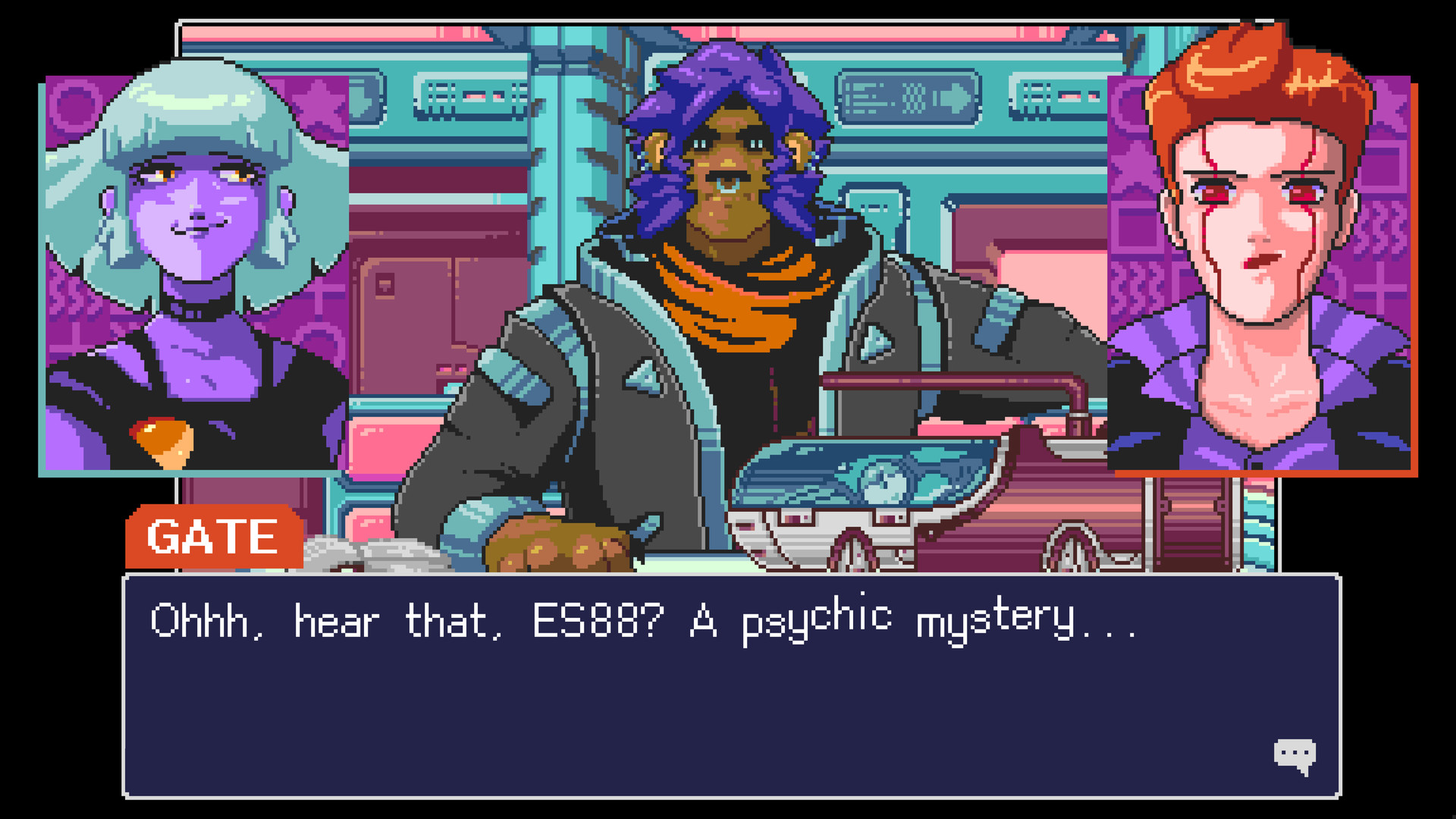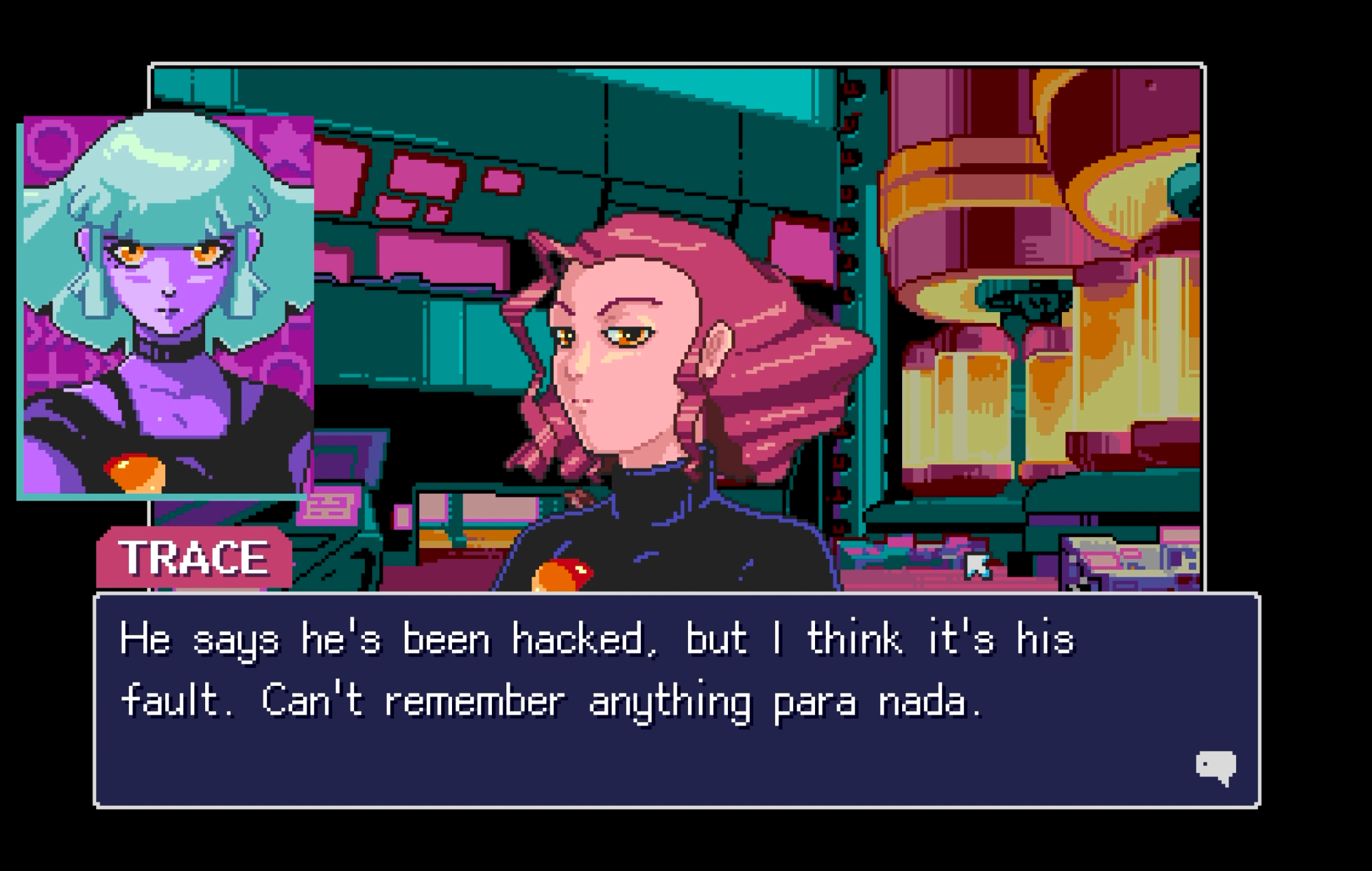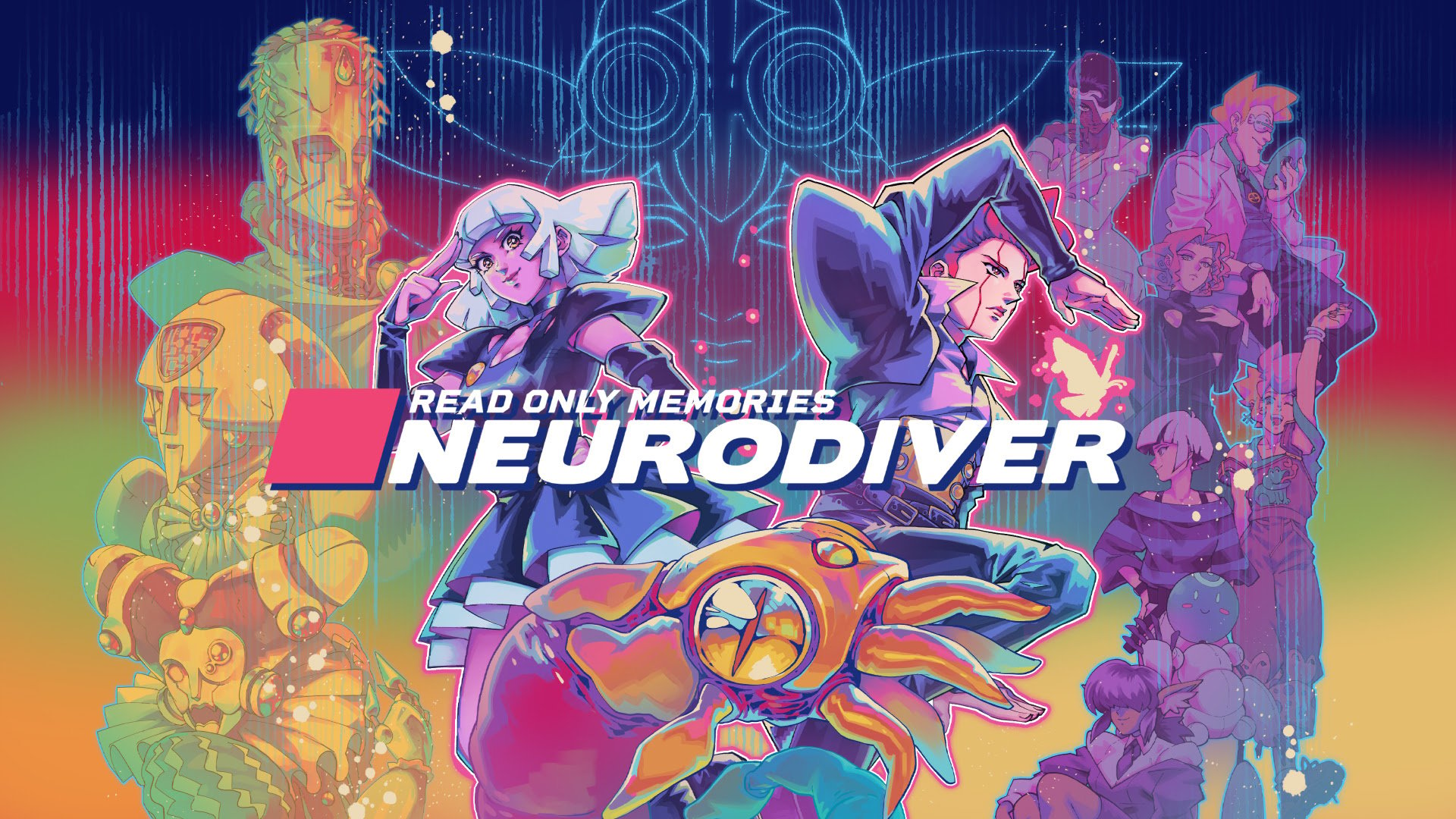Dropping the 2064, keeping the subtitle, making it the new series title, and then adding a new subtitle is Square Enix levels of convoluted game titling, but Read Only Memories: Neurodiver is a much more memorable title than 2064 anyway. Set some 6 years later, Neurodiver is a pixel art point-and-click mystery crossed with a narrative-heavy visual novel.
Set in a cyberpunk future of the most colourful and jazzy variety, it’s the story of a young peppy anime girl with psychic abilities and her strange squid that can read people’s memories. 2064 was a bit of a sleeper hit, making its way onto almost every system between 2015 and 2018, and becoming a modern cult classic amongst those who play point and clicks.
With such a long wait (9 years!) between the games, it’s fair to say that Neurodiver has big shoes to fill. Is Neurodiver the worthy sequel to 2064 that we’re all hoping for, or is it doomed to languish in its predecessor’s shadow?
Luna (or ES88 to use her code name/handle) is an Esper, a kind of future mutant with ESP or psychic abilities, and via her symbiotic connection with the Neurodiver (a kind of psychic squid), her powers are enhanced to the point of being something akin to a psychic therapist, diving into people brains and helping them recover or repair memories, which clearly sets her up for much mystery solving and meddling.
Things kick off with a prologue mission wherein Luna helps a feline anthro called Crow to find and repair a fragment of his memory. It’s nicely written, relatively episodic and formed the demo for the game a few months back. I really thought there would be more jobs, or quests, like this one in the main game, but more on that.
The actual game starts off with the mundane adventure of recovering a forgotten password from a colleague’s memory serving as something of a tutorial to the game’s mechanics. Afterwards, Luna, the Neurodiver, and her partner/guardian GATE are sent on their first proper mission. Psychic vibrations have led to your boss sending you to investigate a few characters and their possible connection to the Golden Butterfly, a kind of hacker or another psychic that we simply can’t have threatening people’s memories. No real reasoning or authority is given. The reason for the meddling and the setup of the game is butterfly-wing thin.
The structure of the game is a series of five chapters, three of which are based around getting to know a character (almost all these outside characters are returning cast from the first game) by pointing and clicking on various items, learning about them via a few questions and having a conversation. Then it’s time to dive into their memories.

Inside the memory, Luna and the player experience a scene from the character’s past, which usually leads to a fragmented image that shouldn’t be there. You need to use the items you’ve collected from pointing, clicking and conversing, to then repair the fragment. Usually, this is simply applying the two or three most thematically appropriate items, and I only got stuck for even a few minutes in one area. As long as you read and click everything it’s pretty simple.
Fragment exorcised, Luna experiences a short-lived run-in with the Golden Butterfly, who just as quickly zaps off again. Go back to base, eat, sleep, rinse and repeat for three chapters and Luna slowly starts to question her sanity and the Golden Butterfly starts to invade her dreams.
I’ll not say anything further for fear of spoilers, and I’ve refrained from naming too many characters, as it’s fun to find the easter eggs from the first game.
It’s not the strongest of stories and it only barely registers as a mystery – the story just kind of rolls on and beyond a few revealed identities, I’m not sure it really achieved what it may have been attempting. That said, it has a fun vibe, a compelling set of characters I never wanted to skip, and a lot of heart. It’s just there wasn’t that much below the surface this time.
Even a player listening to everything can easily finish the story in sub-five hours. If you want, there are a couple of branches where things go in a slightly different direction adding another hour or two if you made good use of saves and want to go back to experience the different endings. There are no side quests, no further episodes to pursue, no exploring the city, not even lore or ebooks to browse – it’s exceptionally narrow-focused and light on content for something that took 9 years to release.

The colourful aesthetic, the 90s-style detective game homage, and the peppy vibe are all wonderful and really gave the game a good feel all its own. I enjoyed just being in the world and spending time with these characters, especially those who return from the first game. The pixel art is great and wonderfully expressive throughout and character models react to virtually every line of the fully voiced dialogue – it’s a natural, but also impressive step up from 2064 in detail, confidence and achievement.
It’s also a treat for the ears, full of breezy future funk tracks and both melodic and ambient earworms. I will continue to listen to the soundtrack following play and many of the tunes sit nicely in a study playlist next to OSTs like Garoad’s work on Va11 HaLLa or the original 2064.
Possibly the strangest oversight in Neurodiver is how little it has to say about AI. Where 2064 was awash with a storyline that involved the awakening of androids and robots to consciousness, and in particular its sidekick/sub-protagonist Turing, Neurodiver is about memory, but less the digital kind and more just the psychic not-very-scientific-kind. In the ten years between the two games AI has become ubiquitous and a looming fear as well as an everyday tool – to not really have anything to say on the subject seemed so strange to me. There are a couple of freed bots around, but it’s not the crux of the plot or even a secondary plotline, it’s really just there. Robot parts go missing in a subplot, but the awakening of the robot hordes is left unexplored and unexamined.

Continuing on a theme, 2064 was about science and cyberpunk stuff and AI – it’s science-fiction of course, but it was grounded in tech. Neurodiver is about a psychic doing very unscientific psychic stuff. It’s effectively a superpower in a world where everything else is robotics and AI and even the anthros are genetically modified. I assume Espers are also genetically created and are something close to a mutant to gain their psychic powers, but it didn’t quite sit right.
I appreciate memories are clearly not untapped territory in cyberpunk – planted memories are very important in the Blade Runner franchise and plenty of other cyberpunk properties. But most of the time cyberpunk deals with tech, the horrific dystopian side of tech, and barely ever deals with something psychic without couching it as a technological advancement. There’s no real attempt to do that here. With no side quests and no content outside the chapters and narrative, there are no explanations of Luna’s powers that I could find, and that left it feeling jarringly magical in a cyberpunk setting.
I enjoyed my short time with Read Only Memories: Neurodiver, just not quite as much as I’d hoped. The presentation is spot on, the characters, dialogue and music are all wonderful. But the game’s focus on its oddly un-cyberpunk story leaves behind any attempt to broaden the series, add meaningful content, or even examine some of the basics. It’s fun to neuro-dive in, but you’ll quickly realise this was the shallow end.
Swimming in 90s vibes, colour, and charm, Neurodiver is a tasty second helping of this vibrant future, full of characters I enjoyed catching up with. Its trouble lies in the lack of content, expansion to the world, or even meaningful explanations of its plot. It’s fun to neuro-dive in, but you’ll quickly realise this is the shallow end of the pool.

Read Only Memories: Neurodiver is available May 16th on PlayStation 5 (review platform), PlayStation 4, Nintendo Switch, Xbox Series S|X, Xbox One, and PC via Steam.
Developer: MidBoss
Publisher: MidBoss, Chorus Worldwide
Disclaimer: In order to complete this review, we were provided with a promotional copy of the game. For our full review policy, please go here.
If you enjoyed this article or any more of our content, please consider our Patreon.
Make sure to follow Finger Guns on our social channels –Twitter, Facebook, Twitch, Spotify or Apple Podcasts – to keep up to date on our news, reviews and features.
